|
| | Mathison Museum of Natural History |  |
|
+17Birdsage Bonnie Saarlooswolfhound widukind Joliezac spacelab Pardofelis landrover Megaptera lucky luke rogerpgvg Jill George pipsxlch Duck-Anch-Amun Kikimalou Roger 21 posters | |
| Author | Message |
|---|
bmathison1972
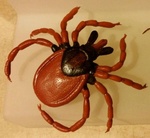
Country/State : Salt Lake City, UT
Age : 52
Joined : 2010-04-13
Posts : 6710
 |  Subject: Re: Mathison Museum of Natural History Subject: Re: Mathison Museum of Natural History  Thu Jul 29, 2021 1:05 pm Thu Jul 29, 2021 1:05 pm | |
| Note: going forward, I am changing 'Year of Release' on these to 'Year of Production' Species: Pagophilus groenlandicus Gray, 1844 (harp seal) About the Figure: Manufacturer: Safari Ltd. Series: Wild Safari Sealife Year of Production: 2004 Size/Scale: Figure length 10.0 cm. Body length 9.0 cm for a scale of 1:18.7-1:21.1 Frequency of species in toy/figure form (at time of posting): Uncommon Miscellaneous Notes: A familiar species, P. groenlandicus has been largely ignored by the 'major' Western companies. Safari Ltd. also produced a pup in 2005 to compliment this adult. About the Animal: Geographic distribution: North Atlantic, Arctic Oceans Habitat: Coastal pack ice Diet: Fish, marine invertebrates IUCN Status (at time of posting): Least Concern Miscellaneous Notes: Populations of P. groenlandicus have fluctuated over the past 150 years due to hunting for food and fur. Today, seals are hunted under certain restrictions to prevent their populations from falling too low. To date, their IUCN status is Least Concern, with a trend of population increasing. [You must be registered and logged in to see this image.] |
|   | | widukind
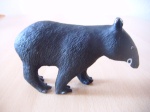
Country/State : Germany
Age : 48
Joined : 2010-12-30
Posts : 45745
 |  Subject: Re: Mathison Museum of Natural History Subject: Re: Mathison Museum of Natural History  Fri Jul 30, 2021 12:35 pm Fri Jul 30, 2021 12:35 pm | |
| |
|   | | bmathison1972

Country/State : Salt Lake City, UT
Age : 52
Joined : 2010-04-13
Posts : 6710
 |  Subject: Re: Mathison Museum of Natural History Subject: Re: Mathison Museum of Natural History  Fri Jul 30, 2021 1:20 pm Fri Jul 30, 2021 1:20 pm | |
| Species: Odorrana narina (Stejneger, 1901) (Ryukyu tip-nosed frog) About the Figure: Manufacturer: Kaiyodo Series: Capsule Q Museum - Okinawa Year of Production: 2013 Size/Scale: Figure height 3.0 cm. Snout-to-vent length 4.5 cm for a scale of 1:1.1 for a male or 1:1.5 for a female Frequency of species in toy/figure form (at time of posting): Unique [as a sculpt] Miscellaneous Notes: Minimal assembly is required. There were two versions of this figure in the Okinawa collection, this one with a green dorsal stripe and another that is brown dorsally. About the Animal: Geographic distribution: Ryukyu Archipelago, Japan Habitat: Rivers in tropical and subtropical lowland forests Diet: Terrestrial and aquatic invertebrates IUCN Status (at time of posting): Endangered Miscellaneous Notes: It is believed Odorrana separated from Rana in the Yunnan-Guizhou Plateau during the late Miocene and further diversified due to niche specialization. The genus migrated to the Ryukyu Archipelago from Taiwan at least twice, resulting in the extant species O. ishikawae and the members of the O. narina-complex. [You must be registered and logged in to see this image.] |
|   | | widukind

Country/State : Germany
Age : 48
Joined : 2010-12-30
Posts : 45745
 |  Subject: Re: Mathison Museum of Natural History Subject: Re: Mathison Museum of Natural History  Fri Jul 30, 2021 3:01 pm Fri Jul 30, 2021 3:01 pm | |
| |
|   | | bmathison1972

Country/State : Salt Lake City, UT
Age : 52
Joined : 2010-04-13
Posts : 6710
 |  Subject: Re: Mathison Museum of Natural History Subject: Re: Mathison Museum of Natural History  Sat Jul 31, 2021 12:42 pm Sat Jul 31, 2021 12:42 pm | |
| Species: Oxyporus sp. About the Figure: Manufacturer: unknown Series: unknown Year of Production: unknown Size/Scale: Body length (excluding appendages) 5.5 cm for a scale of 11:1-4.4:1 [scale species dependent] Frequency of species in toy/figure form (at time of posting): Unique (?) Miscellaneous Notes: This figure came from a set of eight flat, stylized insects purchased from a dollar store sometime between 2000 and 2005. I don't remember anything about it. This is one of the figures in the set I retained since it appears to be recognizable at the genus level. About the Animal: Geographic distribution: North and Central America, Eurasia Habitat: Fruiting bodies of basidiomycete fungi Diet: Larvae and adults feed on host fungi IUCN Status (at time of posting): N/A Miscellaneous Notes: Most members of the family Staphylinidae are predators on other soft-bodied invertebrates. However, despite their large, fearsome-lookin mandibles, members of the genus Oxyporus feed on the fruiting bodies of the fungi in which they live. [You must be registered and logged in to see this image.] |
|   | | bmathison1972

Country/State : Salt Lake City, UT
Age : 52
Joined : 2010-04-13
Posts : 6710
 |  Subject: Re: Mathison Museum of Natural History Subject: Re: Mathison Museum of Natural History  Sun Aug 01, 2021 1:20 pm Sun Aug 01, 2021 1:20 pm | |
| Species: Martes melampus tsuensis (Thomas, 1897) Tsushima Island marten About the Figure: Manufacturer: Kaiyodo Series: Natural Monuments of Japan Year of Production: 2002 Size/Scale: Figure 5.5 cm tall. Head-and-body length approximately 7.0 cm for a scale of 1:6.7-1:7.8 Frequency of species in toy/figure form (at time of posting): Rare Miscellaneous Notes: Some assembly is required. Kaiyodo made three other figures of this species (two of which represent this subspecies), but none of those come with habitat-style bases. About the Animal: Geographic distribution: Tsushima Islands, Japan Habitat: Boreal forests, open fields Diet: Opportunistic omnivore, including berries, seeds, bird eggs, small mammals, terrestrial invertebrates IUCN Status (at time of posting): Least Concern [as a species; this subspecies has not been specifically evaluated] Miscellaneous Notes: Molecular analysis shows the Tsushima populations of M. melampus form two genetic clusters. Restricted gene flow or inbreeding may have reduced genetic diversity in the Tsushima populations, having been genetically isolated from mainland populations since the formation of the Tsushima Strait. [You must be registered and logged in to see this image.] |
|   | | Saarlooswolfhound
Moderator

Country/State : USA
Age : 28
Joined : 2012-06-16
Posts : 12055
 |  Subject: Re: Mathison Museum of Natural History Subject: Re: Mathison Museum of Natural History  Sun Aug 01, 2021 6:33 pm Sun Aug 01, 2021 6:33 pm | |
| I LOVE that marten, what an excellent figure! _________________ -"I loathe people who keep dogs. They are cowards who haven’t got the guts to bite people themselves."-August Strindberg (However, anyone who knows me knows I love dogs [You must be registered and logged in to see this image.] ) -“We can try to kill all that is native, string it up by its hind legs for all to see, but spirit howls and wildness endures.”-Anonymous |
|   | | Jill

Country/State : USA
Age : 39
Joined : 2021-04-13
Posts : 2349
 |  Subject: Re: Mathison Museum of Natural History Subject: Re: Mathison Museum of Natural History  Sun Aug 01, 2021 6:47 pm Sun Aug 01, 2021 6:47 pm | |
| That marten is amazing! I also love the frog and the seal! |
|   | | bmathison1972

Country/State : Salt Lake City, UT
Age : 52
Joined : 2010-04-13
Posts : 6710
 |  Subject: Re: Mathison Museum of Natural History Subject: Re: Mathison Museum of Natural History  Mon Aug 02, 2021 1:52 pm Mon Aug 02, 2021 1:52 pm | |
| Species: Papilio machaon Linnaeus, 1758 (Old World swallowtail) About the Figure: Manufacturer: Ikimon Series: Science Techni Colour - Private Specimen of a Lepidopterist Acrylic Mascot 1 Year of Production: 2017 Size/Scale: Wingspan 4.5 cm for a scale of 1:1.4-1:1.7 Frequency of species in toy/figure form (at time of posting): Uncommon Miscellaneous Notes: The figures in this set are essentially photographs of butterflies embedded in acrylic. Flip the figure over and the underside reveals an image of the ventral side of the animal, too. They are also sold as keychains (hence the hole in the acrylic above the head). About the Animal: Geographic distribution: Holarctic Habitat: Highly varied, including forests, grasslands, hilltops, Alpine meadows, tundra, wetlands, disturbed areas, gardens Diet: Larvae feed on primarily on plants in the families Apiaceae (umbillifers), but also Rutaceae (rues); adults take nectar from flowers. IUCN Status (at time of posting): Least Concern [Europe] Miscellaneous Notes: Papilio machaon has only been IUCN-evaluated for Europe. And although it is classified as Least Concern there, it is generally considered rare throughout its range. It is protected by law in Austria, Czech Republic, Slovakia, Hungary, Romania, United Kingdom, and Moldovia. In South Korea it is listed as 'vulnerable' in their Red Data Book, and one subspecies is protected in India. [You must be registered and logged in to see this image.] |
|   | | bmathison1972

Country/State : Salt Lake City, UT
Age : 52
Joined : 2010-04-13
Posts : 6710
 |  Subject: Re: Mathison Museum of Natural History Subject: Re: Mathison Museum of Natural History  Tue Aug 03, 2021 1:00 pm Tue Aug 03, 2021 1:00 pm | |
| Species: Scorpiones, gen. sp. About the Figure: Manufacturer: Safari Ltd. Series: Hidden Kingdom Insects; Incredible Creatures Years of Production: 2000 and 2018 Size/Scale: Body length (excluding pedipalps) 17.5 cm [scale species dependent, see below] Frequency of species in toy/figure form (at time of posting): N/A [frequency species dependent; scorpions in general are very common] Miscellaneous Notes: These two figures represent different paint jobs of the same sculpt. The yellow version was released in 2000 as part of the Hidden Kingdom Insects line; the brown version was released in 2018 as part of the Incredible Creatures Line, at which time the remaining HK figures were folded into the IC line. Both figures have wires in the pedipalps and metasoma, allowing them to be bent into the desired pose of the collector. Neither figure was marketed at the species level. Historically, it has been suggested the yellow version represents the Arizona desert hairy scorpion ( Hadrurus arizonensis), but the brown version doesn't match that species quite as well. If one chooses to have either of these figures represent H. arizonensis, the figure would be slightly larger than 1:1 scale for a maximum-sized specimen. About the Animal: Geographic distribution: Nearly worldwide Habitat: Highly varied; most common in deserts but also fields, disturbed areas, forests, rainforests, mountaintops, and intertidal zones. Diversity greatest in subtropical areas Diet: Predator on terrestrial arthropods; larger species may take lizards, snakes, small mammals, earthworms, and mollusks. Several species are specialized predators. IUCN Status (at time of posting): N/A [species dependent] Miscellaneous Notes: Scorpions are among the oldest terrestrial animals known. Fossils of scorpions date back to the Silurian; the presumptive marine Dolichophonus loudonensis is known from the Telychian of modern-day Scotland. Gondwanascorpio emzantsiensis from the Devonian (Famennian) of modern-day South Africa is the oldest terrestrial animal known from Gondwana. Morphologically, extant scorpions are not unlike their ancient cousins. [You must be registered and logged in to see this image.] |
|   | | Bonnie
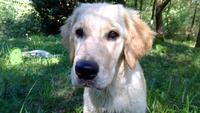
Country/State : UK
Age : 19
Joined : 2020-10-14
Posts : 5584
 |  Subject: Re: Mathison Museum of Natural History Subject: Re: Mathison Museum of Natural History  Tue Aug 03, 2021 1:57 pm Tue Aug 03, 2021 1:57 pm | |
| Lovely scorpions!  |
|   | | bmathison1972

Country/State : Salt Lake City, UT
Age : 52
Joined : 2010-04-13
Posts : 6710
 |  Subject: Re: Mathison Museum of Natural History Subject: Re: Mathison Museum of Natural History  Wed Aug 04, 2021 12:49 pm Wed Aug 04, 2021 12:49 pm | |
| Species: Isistius brasiliensis (Quiy et Gaimard, 1824) (cookiecutter shark) About the Figure: Manufacturer: Takara Tomy A.R.T.S. Series: Ocean Predators - Sharks Year of Production: unknown Size/Scale: Body length 4.3 cm for a scale of 1:8.8-1:10 Frequency of species in toy/figure form (at time of posting): Very rare Miscellaneous Notes: The figure is removable from its base. The only other figures of this species I am aware of are by Colorata and Neko Works, the latter of which comes unfinished and needs to be painted. About the Animal: Geographic distribution: Circumtropical Habitat: Bathypelagic, at depths of 0-3700 meters (usually below 85 meters) Diet: Large fish, cetaceans, squid, crustaceans IUCN Status (at time of posting): Least Concern Miscellaneous Notes: Isistius brasiliensis gets its common name ‘cookiecutter’ shark from its habit of taking bites out of the skin and soft tissues of large fish and cetaceans, reminiscent of the use of a cookie cutter. They are considered facultative ectoparasites, because in addition to this unusual feeding habit, they will also ingest entire smaller animals, such as smaller fish and invertebrates. [You must be registered and logged in to see this image.] |
|   | | Roger
Admin
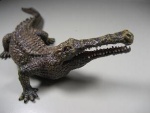
Country/State : Portugal
Age : 50
Joined : 2010-08-20
Posts : 35835
 |  Subject: Re: Mathison Museum of Natural History Subject: Re: Mathison Museum of Natural History  Wed Aug 04, 2021 1:54 pm Wed Aug 04, 2021 1:54 pm | |
| Seeing your marten, i wonder why martens got forgoten among European brands. Schleich, Bullyland and even ELC released them as iconic members of the European fauna but now they seem to be forgoten to the eternity. |
|   | | bmathison1972

Country/State : Salt Lake City, UT
Age : 52
Joined : 2010-04-13
Posts : 6710
 |  Subject: Re: Mathison Museum of Natural History Subject: Re: Mathison Museum of Natural History  Thu Aug 05, 2021 12:43 pm Thu Aug 05, 2021 12:43 pm | |
| Species: Ameerega braccata (Steindachner, 1864) About the Figure: Manufacturer: Club Earth Series: Poison Frogs Alive! Year of Production: unknown Size/Scale: Snout-to-vent length 3.8 cm for a scale of 1:2-1:1.5 Frequency of species in toy/figure form (at time of posting): Unique [as a sculpt] Miscellaneous Notes: This figure is stamped Wing Mau but the packaging indicated Club Earth, reinforcing the relationship between these two companies (Wing Mau produced figures for several companies, including Club Earth). The sculpt was also used for the Frogs to Go collection by Club Earth (and possibly others). This figure is stamped Epipedobates tricolor, which must just be a production error since the set also includes E. tricolor and the sculpts are not the same. About the Animal: Geographic distribution: Cerrado Region, Brazil Habitat: Tropical dry forests, shrubland, grasslands, rivers Diet: Insects, primarily ants, termites, and mites IUCN Status (at time of posting): Least Concern Miscellaneous Notes: After calling for a mate, the male A. braccata leads the female to an oviposition spot, usually in shaded leaf litter. After the eggs hatch, the male carries the young tadpoles on his back to a nearby body of water (usually a river or stream) where the young complete their development. A female lays egg masses containing around 30 eggs, but a male can only carry 5-7 larvae on his back; as such, he needs to make frequent trips back and forth between the oviposition spot and water. [You must be registered and logged in to see this image.] |
|   | | Megaptera
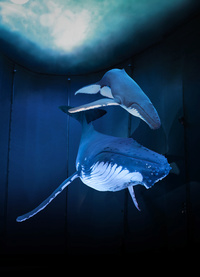
Country/State : Germany
Age : 34
Joined : 2017-11-11
Posts : 1950
 |  Subject: Re: Mathison Museum of Natural History Subject: Re: Mathison Museum of Natural History  Thu Aug 05, 2021 8:12 pm Thu Aug 05, 2021 8:12 pm | |
| Very interesting frog model. I never looked for some Club Earth models. They look pretty good. |
|   | | bmathison1972

Country/State : Salt Lake City, UT
Age : 52
Joined : 2010-04-13
Posts : 6710
 |  Subject: Re: Mathison Museum of Natural History Subject: Re: Mathison Museum of Natural History  Fri Aug 06, 2021 12:53 pm Fri Aug 06, 2021 12:53 pm | |
| Species: Asio otus (Linnaeus, 1758) (long-eared owl) About the Figure: Manufacturer: Safari Ltd. Series: Wings of the World Year of Production: 2018 Size/Scale: Figure height 6.5 cm. Body length about 7.3 cm for a scale of 1:4.2-1:5.5 Frequency of species in toy/figure form (at time of posting): Rare Miscellaneous Notes: Other than the face, the paint application on this figure is overly simple, and the bird itself blends into its perch. Some vintage figures have been attributed to this species, but the only other figure I am aware of specifically marketed as A. otus is by Kaiyodo in the Capsule Q Museum line. About the Animal: Geographic distribution: Holarctic Habitat: Forest edges and clearings, semi-open taiga forest, bogs, agricultural land and fruit orchards, parks, cemeteries, gardens; in general, areas mixed with open spaces for hunting and wooded areas for roosting and nesting. Diet: Primarily rodents and lagomorphs, but also other small mammals, small birds, reptiles, and insects IUCN Status (at time of posting): Least Concern Miscellaneous Notes: There are four subspecies of A. otus. The nominate A. o. otus occurs throughout the Palearctic. Asio o. canariensis is endemic to the Canary Islands. There are two subspecies in North America: A. o. wilsonianus which occurs in the Northeast and A. o. tuftsi which occurs in the West and Midwest. Most populations appear relatively stable, but they are still protected under CITES Appendix II and the U.S. Migratory Bird Act. [You must be registered and logged in to see this image.] |
|   | | bmathison1972

Country/State : Salt Lake City, UT
Age : 52
Joined : 2010-04-13
Posts : 6710
 |  Subject: Re: Mathison Museum of Natural History Subject: Re: Mathison Museum of Natural History  Sat Aug 07, 2021 1:41 pm Sat Aug 07, 2021 1:41 pm | |
| Species: Lobophyllia radians (Milne-Edwards et Haime, 1849) (lobed brain coral) About the Figure: Manufacturer: Yujin Series: Corals in Colour Year of Production: 2005 Size/Scale: Figure 2.7 cm long for a scale of 1:5.5-1:7.4 Frequency of species in toy/figure form (at time of posting): Unique Miscellaneous Notes: This figure was marketed as Symphyllia radians, which is now considered a synonym of L. radians. The Yujin corals are small and made out of a limestone-calcium carbonate sandstone, rather than the usual PVC. They make great accessories for other marine wildlife. About the Animal: Geographic distribution: Indo-Pacific Habitat: Coral reefs, at depths of 0-40 meters Diet: Floating microorganisms that come within reach of their tentacles; also, nutrients derived from photosynthetic dinoflagellates living within the coral's tissues IUCN Status (at time of posting): Least Concern Miscellaneous Notes: It appears that what is currently known as L radians is a species complex, containing more than one cryptic species that are grossly morphologically similar to one another. [You must be registered and logged in to see this image.] |
|   | | widukind

Country/State : Germany
Age : 48
Joined : 2010-12-30
Posts : 45745
 |  Subject: Re: Mathison Museum of Natural History Subject: Re: Mathison Museum of Natural History  Sat Aug 07, 2021 3:33 pm Sat Aug 07, 2021 3:33 pm | |
| |
|   | | bmathison1972

Country/State : Salt Lake City, UT
Age : 52
Joined : 2010-04-13
Posts : 6710
 |  Subject: Re: Mathison Museum of Natural History Subject: Re: Mathison Museum of Natural History  Sun Aug 08, 2021 12:54 pm Sun Aug 08, 2021 12:54 pm | |
| Species: Kirkaldyia deyrollei (Vuillefroy, 1864) (Japanese giant water bug) About the Figure: Manufacturer: Yujin Series: Insects of Japan Vol. 3 Year of Production: 2007 Size/Scale: Body length (excluding appendages) 6.0 cm for a scale of 1:1 Frequency of species in toy/figure form (at time of posting): Uncommon to rare Miscellaneous Notes: Some assembly is required. The Yujin Insects of Japan figures are believed to be cast from actual specimens and are therefore all in the 1:1 scale. This is probably the best figure to date of K. deyrollei outside of the giant 2021 Kaiyodo Revogeo model. About the Animal: Geographic distribution: Southeast Asia Habitat: Freshwater lakes, ponds, marshes, ditches, temporary pools, rice paddies Diet: Primarily aquatic insects, small fish, and amphibians; occasionally young turtles and water snakes IUCN Status (at time of posting): Not Evaluated Miscellaneous Notes: Female K. deyrollei lay their eggs on vegetation above water. The male guards the eggs from potential predators and keeps them moist by regularly supplying them with water. On occasion, females will destroy eggs that are not hers to secure a future for her offspring. [You must be registered and logged in to see this image.] |
|   | | Bonnie

Country/State : UK
Age : 19
Joined : 2020-10-14
Posts : 5584
 |  Subject: Re: Mathison Museum of Natural History Subject: Re: Mathison Museum of Natural History  Sun Aug 08, 2021 2:19 pm Sun Aug 08, 2021 2:19 pm | |
| I love these models that are cast from actual specimens- it makes them stunningly realistic!  |
|   | | bmathison1972

Country/State : Salt Lake City, UT
Age : 52
Joined : 2010-04-13
Posts : 6710
 |  Subject: Re: Mathison Museum of Natural History Subject: Re: Mathison Museum of Natural History  Mon Aug 09, 2021 1:41 pm Mon Aug 09, 2021 1:41 pm | |
| Species: Polistes annularis (Linnaeus, 1758) (ringed paper wasp) About the Figure: Manufacturer: Skillcraft Series: Insect Lab Year of Production: 1998 Size/Scale: Wingspan 8.0 cm. Forewing length 3.5 cm for a scale of 2:1-1.5:1 Frequency of species in toy/figure form (at time of posting): Unique Miscellaneous Notes: The Skillcraft Insect Lab is a model kit, and the figures must be assembled and painted by the user. These were some of my earliest attempts at painting figures. The main focus of the Insect Lab set was a large anatomical model of a field cricket. However, there were five individual insects (including today's) that were marketed at the species level, four of which are currently unique and a fifth which is uncommon in toy form. About the Animal: Geographic distribution: Eastern North America Habitat: Forests, fields, disturbed areas, houses and buildings; usually nests in trees and shrubs, but also under the eaves of buildings. Large aggregations of colonies are usually built under rocky cliffs, often in riparian areas. Diet: Larvae are fed lepidopteran larvae provided by adults; adults feed primarily on nectar and juices from overripe fruit. IUCN Status (at time of posting): Not Evaluated Miscellaneous Notes: Like other eusocial hymenopterans, P. annularis has a complex colony cycle. Mated females (foundresses) construct a new nest in the spring, usually with the help of other foundresses (associations). One foundress is the dominant queen, however the associations can also lay eggs in the colony. However, the primary role of the associations is to forage for food for developing larvae. The first brood is usually made of up non-reproductive females which serve as a labor force. Associations may start dying off after the first brood emerges. Later broods will consist of reproductive females, and then males. If a dominant queen dies early, a reproductive worker could emerge and assume the role of the queen. [You must be registered and logged in to see this image.]
Last edited by bmathison1972 on Mon Aug 09, 2021 10:48 pm; edited 1 time in total |
|   | | Saarlooswolfhound
Moderator

Country/State : USA
Age : 28
Joined : 2012-06-16
Posts : 12055
 |  Subject: Re: Mathison Museum of Natural History Subject: Re: Mathison Museum of Natural History  Mon Aug 09, 2021 6:49 pm Mon Aug 09, 2021 6:49 pm | |
| Great models again! That Japanese water bug gives me the shivers.  _________________ -"I loathe people who keep dogs. They are cowards who haven’t got the guts to bite people themselves."-August Strindberg (However, anyone who knows me knows I love dogs [You must be registered and logged in to see this image.] ) -“We can try to kill all that is native, string it up by its hind legs for all to see, but spirit howls and wildness endures.”-Anonymous |
|   | | bmathison1972

Country/State : Salt Lake City, UT
Age : 52
Joined : 2010-04-13
Posts : 6710
 |  Subject: Re: Mathison Museum of Natural History Subject: Re: Mathison Museum of Natural History  Tue Aug 10, 2021 12:55 pm Tue Aug 10, 2021 12:55 pm | |
| Species: Falco peregrinus Tunstall, 1771 (peregrine falcon) About the Figure: Manufacturer: Safari Ltd. Series: Wings of the World Year of Production: 2018 Size/Scale: Figure width 9.5 cm. Body length approximately 6.3 cm for a scale of 1:5.7-1:7.8 (male) or 1:7.1-1:9.2 (female) Frequency of species in toy/figure form (at time of posting): Uncommon Miscellaneous Notes: My first peregrine falcon figure was by CollectA, but I was really disappointed in the paint job. I replaced it with this Safari figure which I think was a wise decision, it is one of the best, if not the best, version of this species, in my personal opinion. About the Animal: Geographic distribution: Nearly worldwide (absent from large rainforests, large extreme deserts, and extreme polar regions) Habitat: Prefer open habitats, such as mountain valleys, grasslands, meadows, tundra, shorelines, yards and gardens; some populations adapted to large urban areas. Nests in tall, open areas such as cliff faces and tall buildings. Diet: Primarily other birds, on occasion bats and rodents IUCN Status (at time of posting): Least Concern Miscellaneous Notes: Falco peregrinus is considered the fasted bird in the world. When hunting other birds in process called a 'stoop' (whereby the falcon flies to a high altitude and then dive-bombs its prey), it can reach speeds of more than 320 km/hr (200 mph). [You must be registered and logged in to see this image.] |
|   | | bmathison1972

Country/State : Salt Lake City, UT
Age : 52
Joined : 2010-04-13
Posts : 6710
 |  Subject: Re: Mathison Museum of Natural History Subject: Re: Mathison Museum of Natural History  Wed Aug 11, 2021 12:45 pm Wed Aug 11, 2021 12:45 pm | |
| Species: Ahaetulla nasuta (Lacépède, 1789) (green vine snake; Sri Lankan vine snake; long-nosed whip snake) About the Figure: Manufacturer: Yowie Group Series: Colors of the Animal Kingdom Year of Production: 2019 Size/Scale: Figure 5.5 cm wide. If stretched out, figure would be approximately 27.5 cm long for a scale of 1:3.6-1:4.4 [see below] Frequency of species in toy/figure form (at time of posting): Unique Miscellaneous Notes: This figure is somewhat stylized, as the body length is short in relation to the length of the head. If one were to use head length for scale, it would probably scale larger than what I calculated above based on approximate body length. Unfortunately, I had trouble finding any information on the length of the head of A. nasuta. About the Animal: Geographic distribution: Sri Lanka Habitat: Low bushes, shrubs, and trees, usually in riparian areas Diet: Frogs, lizards IUCN Status (at time of posting): Not Evaluated Miscellaneous Notes: Historically, A. nasuta was considered having a broad distribution throughout much of Southeast Asia from India to Cambodia and Thailand. However, a 2020 phylogenetic study revealed A. nasuta to represent a species complex, with true A. nasuta being restricted to the island of Sri Lanka. Three populations from mainland India were described as new species ( A. borealis, A. farnsworthi, and A. malabarica) while two were found to be conspecific with previously-described species ( A. isabellina and A. oxyrhyncha). The population in peninsular Southeast Asia is an as-of-yet undescribed species. [You must be registered and logged in to see this image.] |
|   | | Bonnie

Country/State : UK
Age : 19
Joined : 2020-10-14
Posts : 5584
 |  Subject: Re: Mathison Museum of Natural History Subject: Re: Mathison Museum of Natural History  Wed Aug 11, 2021 12:46 pm Wed Aug 11, 2021 12:46 pm | |
| I love that Falcon's pose!  |
|   | | Sponsored content
 |  Subject: Re: Mathison Museum of Natural History Subject: Re: Mathison Museum of Natural History  | |
| |
|   | | | | Mathison Museum of Natural History |  |
|
Similar topics |  |
|
| | Permissions in this forum: | You cannot reply to topics in this forum
| |
| |
| |
